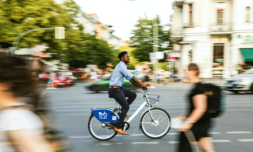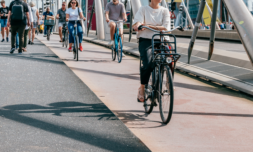Across Europe, more and more people are swapping cars and public transport for bikes. Great for our health and the planet’s, several businesses have begun rewarding this form of commuting.
Commuting can be pretty bleak.
For those of us in the UK, this is especially the case during summer, when getting to work involves squeezing onto the tube like sardines in a tin – except on occasion that tin reaches temperatures as high as 30°C and there’s a great deal more sweat.
Driving, getting an Uber, or catching the bus isn’t usually any better either, particularly in London, where traffic jams will have you collapsing into the office well-past 9am reciting the words ‘sorry I’m late’ for the third time that week.
Whether or not it’s as bad across the rest of Europe, I couldn’t say.
But as more and more countries continent-wide start offering cycle to work schemes, I’d assume that taking public transport or wasting hours behind the wheel has become increasingly less appealing for Europeans without remote jobs, just as it has here.
In France, Italy, Belgium, Luxembourg, and The Netherlands, a growing number of businesses have begun rewarding bike-riding employees.
The reason for this is twofold, seeking to bolster more than efficacy alone.
For starters, cycling does wonders for our physical and mental health.
Not only can it strengthen your joints, lower your cholesterol, improve your posture, boost your stamina, and even extend your life span, but thanks to the endorphins it releases and the fresh air you’re exposed to while peddling along, it can also ease feelings of stress, depression, or anxiety and put you in a good mood.
Secondly, it’s a fantastic alternative to other carbon-intensive, pollution-generating, and gas-guzzling forms of commuting, making it one of the best options out there for the environment.
For example, Dutch people cycle an average of 2.6km a day.
If this pattern was replicated worldwide, annual global emissions would drop by 686 million tonnes, which is more than the UK’s entire carbon footprint.
The government encourages this habit by offering bike commuters a ‘mileage allowance’ whereby businesses reward employees who cycle with €0.19 per kilometre that they can deduct from their tax bill.




















